Union Minister for Road Transport and Highways, Nitin Gadkari, has revealed a major setback in India’s ambitious infrastructure development plans. As per recent updates, 489 National Highway (NH) projects are currently delayed due to various hurdles, with land acquisition and environmental clearance issues being the primary bottlenecks. This situation has raised concerns regarding the timely execution of key road connectivity initiatives under the Bharatmala and other major highway development programs.
Scale of the Problem
The delay of nearly 500 NH projects is significant, especially when considering the government’s goal of building high-quality road infrastructure at an accelerated pace. These projects are spread across multiple states and include critical expressways, economic corridors, bypasses, and rural connectivity roads. With India’s infrastructure push being one of the cornerstones of economic growth, such delays risk slowing progress across sectors like logistics, tourism, agriculture, and trade.
Key Reasons for the Delays
- Land Acquisition Issues
Acquiring land for infrastructure in India is often a lengthy and contested process. Resistance from landowners, delays in compensation payments, legal disputes, and local protests have all contributed to stalling several projects. In some states, acquisition has been delayed by more than two years. - Environmental and Forest Clearances
Many highway projects pass through eco-sensitive zones, forest areas, or tribal belts. Obtaining clearance from the Ministry of Environment, Forest and Climate Change (MoEFCC) has proven time-consuming. Clearance processes involve multiple surveys, public hearings, and approvals from state and central bodies. - Utility Shifting and Relocation
Projects often face delays due to relocation of utilities such as water pipelines, electricity poles, telecom cables, and railway crossings. These tasks require coordination among various departments, and bureaucratic red tape often slows the process. - Contractor and Financial Issues
Delays are also being attributed to contractors’ inability to meet deadlines, funding bottlenecks, and non-performing assets (NPAs) among infrastructure developers. Some private partners have struggled with financial closures or securing timely funding from banks.
Government Response
Minister Gadkari has emphasized that the government is taking multiple steps to overcome these challenges. These include:
- Single Window Clearance System to fast-track environmental and forest approvals.
- Digitized land records and GIS mapping to ensure quicker and more transparent land acquisition.
- Stronger coordination between central ministries and state governments to resolve local issues.
- Introduction of the PM Gati Shakti platform, aimed at integrating infrastructure planning across sectors and ministries to reduce redundancy and delays.
- Regular review meetings with state authorities to unlock stalled projects and fast-track clearances.
Gadkari has also appealed to states to take ownership and assist the Centre in resolving disputes more swiftly. He stressed the importance of cooperative federalism, stating that infrastructure development is a shared responsibility between the Centre and states.
Impact on Development Goals
These delays are affecting not just road users but also the government’s broader goals. Projects under schemes like Bharatmala Pariyojana, National Infrastructure Pipeline (NIP), and Sagarmala are time-sensitive. Each delay increases project costs and reduces the intended benefits of faster connectivity, reduced fuel consumption, and economic upliftment of backward regions.
Moreover, the stalling of highway construction impacts the employment of lakhs of workers, disrupts supply chains, and reduces the overall pace of economic recovery, particularly after the COVID-19 slowdown.
Group Media Publication
Construction, Infrastructure and Mining
General News Platforms – IHTLive.com
Entertainment News Platforms – https://anyflix.in/




%20final.png)




%20/23%20cimr%204.jpg)
